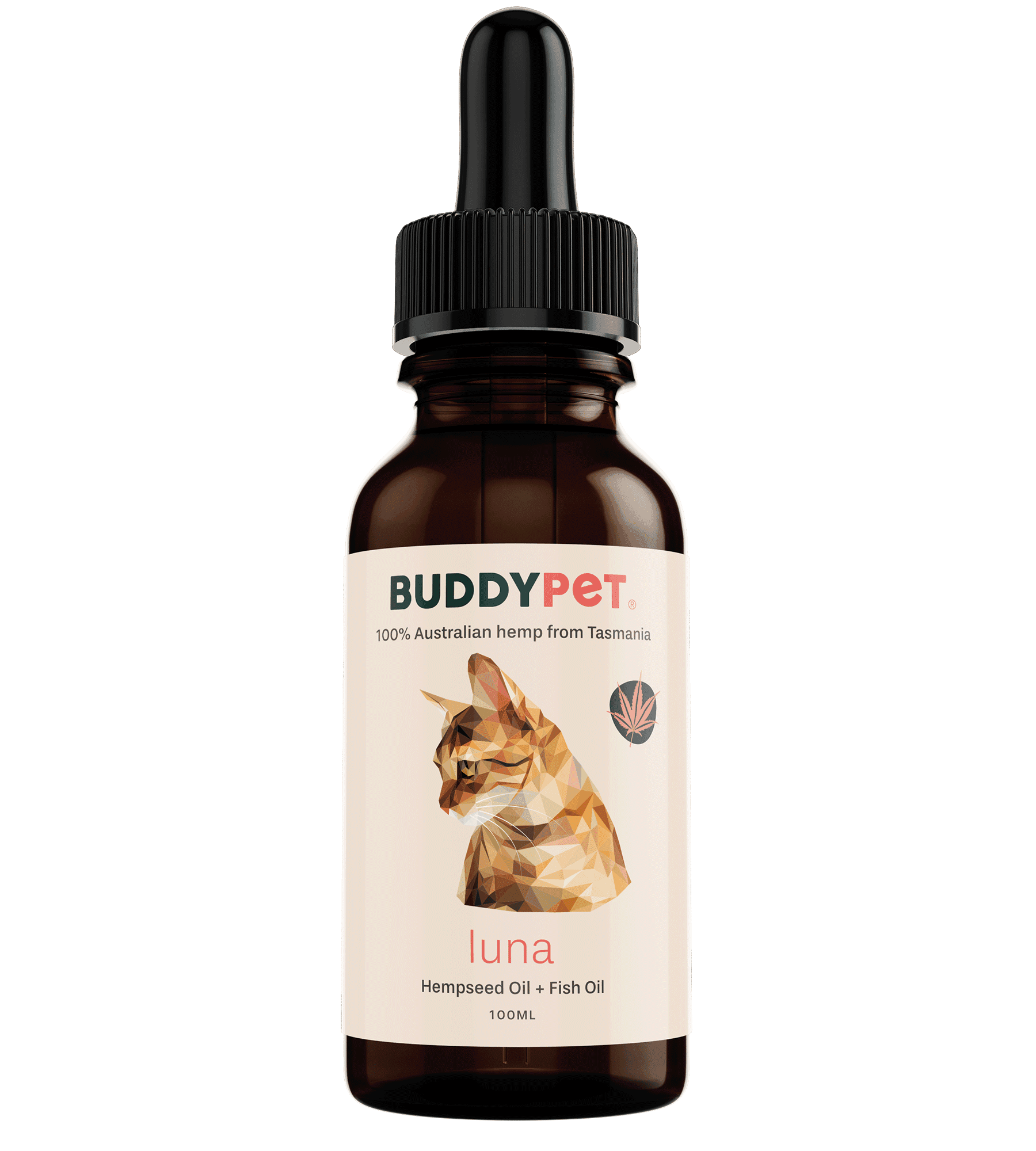First, let’s define what is senior for a cat. A few decades ago, a cat would be considered senior at seven years of age. But given the significant improvements in nutrition, home care, advancements in veterinary science, medical treatments and regular health checks, cats can live much longer – the new senior starts at 11 years and the super senior at 15.
When thinking of how to support your senior cat, it might help to think of their age in human terms. The formula to calculate the human age equivalent for a cat is simple: the first 2 years of their life equate to 24 human years, and every year after that equals 4 human years. Thus, a 15-year-old senior cat would be 76 in human age.
What happens as cats age?
Many physical and behavioural changes accompany the aging process for most cats:
- Oxidative stress accumulated throughout life creates chronic inflammation in the body, which impairs the immune function to fight off foreign invaders. Compromised immune function becomes less capable of stopping/reversing or slowing down the progression of some of the chronic and autoimmune diseases that can, unfortunately, make our cats’ lives very uncomfortable.
- Decreased digestion and ability to absorb and metabolise nutrients can lead to deficiencies in some essential ones like fatty acids and certain minerals (potassium, magnesium, zinc) and vitamins (D, E), which can further impair your cat’s immune function.
- Dental disease is a significant and very common issue for older cats, resulting in discomfort or pain when eating. As a result, you might see your cat losing interest in food and eating less.
- Ingrown, thick or brittle claws.
- Sleeping more, playing less and appearing somewhat apathetic or lethargic.
- As with humans, some hearing loss is very common for super seniors.
- Some hair loss and matting as older cats can’t groom themselves as effectively as they used to in their younger, more flexible age.
- Decline in cognitive function and memory loss, which you could recognise as occasional disorientation, confusion, wandering, and avoiding social contact.
- Decline in kidney function. It has been estimated that nearly 50% of cats over 15 years of age will have some degree of chronic kidney disease present. The worst thing about kidney disease is that cats won’t show any signs until 70-75% of their kidney function is gone. So, by the time the chronic kidney disease is diagnosed, it could already progress to advanced stages. Watch for signs of excessive thirst and increased urination – these could indicate that the kidneys are not functioning well. These symptoms could also be a sign of hyperthyroidism, diabetes or liver disease. Either way, you must see your vet right away to get help.
- Osteoarthritis, or degenerative joint disease, is another prevalent chronic disease in older cats. Cats with damaged, arthritic joints will feel stiff or sore when trying to jump onto their favourite windowsill or climb your bed, so they will probably look for things in between to help them get up, like a chair or a bed stool.
Although ageing is inevitable, and so are many age-related diseases, you can still do a lot to prevent, delay the onset or slow down the progression to create the most comfortable life possible for your senior cats.
Here are our top 10 recommendations for how to support your little furball.
1. Encourage Water Drinking
Your senior cat must stay well hydrated. Cats with kidney disease will struggle to conserve water, so they are most likely to become dehydrated. Maintaining a good fluid intake can be very helpful in slowing down the progression of kidney disease.
Increase your cat’s water intake by switching to canned food and introducing more options for drinking water – add water bowls and water fountains to areas away from where they usually eat food. You may need to experiment with the type of container (ceramic, glass, etc.) or the type of water (spring, tap, boiled, filtered, etc.) If you have a cat that hates water, try adding some tuna springwater (from the tin) or chicken broth to entice them with the smell and taste they already like.
Water balls, like food bowls, may be more comfortable for senior cats if you raise them off the ground a little, so there is less tension in their neck.
2. Dental Checks
Infections in the mouth can enter the bloodstream and affect the liver, kidneys and heart. So, paying attention to your kitty’s teeth and gums is paramount. Check your cat’s mouth regularly for signs of a problem: growths, reddening of the gums, bad breath, drooling, pawing at the mouth, or loss of appetite – all these can be signs of dental disease. We recommend a thorough veterinary exam and dental cleaning procedure every six months or more often if necessary. Routine dental care can drastically improve your cat’s quality of life and possibly even extend their life.
3. Diet
As with humans, metabolism slows down with age, making digestion of fat and protein a little more challenging. Some cats might occasionally vomit as they don’t absorb food so well anymore. We recommend feeding small meals throughout the day and changing to a super-premium wet food diet, which will have special nutrients and a balance of macros (carbs, protein, fat), designed especially for senior cats to support their digestion and joint and kidney health. We recommend that you consider dietary health supplements to support your kitty’s immune system with some anti-inflammatory fatty acids and antioxidants, which they might need a little more of in their golden years. Chat to your vet about choosing the proper diet for your cat.
Look at BUDDYPET Luna, a blend of fish oil and hemp seed oil for health support in senior cats.
Chat to your vet about finding the best diet for your cat.
4. Arthritis
Cats are masters at hiding their pain, so observe closely. 90% of senior cats will show evidence of arthritis when x-rayed, yet most of us wouldn’t have the slightest idea.
Arthritis is characterised by inflammation of a joint or several joints. This can occur naturally over time due to wear and tear or may be linked to a specific injury or disease process. If you’re suspicious that your cat could be suffering from joint pain or arthritis, don’t hesitate to reach out to your veterinarian. You must catch the symptoms of their arthritis early to reduce any further damage to their joints.
Keep your cat in shape. Weight gain can make their movements uncomfortable: as little as half a kilo (one pound) of excess weight can add pressure and increase joint pain.
Change to horizontal scratchers. Using vertical scratchers (like a scratching post) can put a strain on arthritic joints. Horizontal scratchers will be more comfortable while providing important exercise for the forelimbs and muscles.
At BUDDYPET, we recommend Luna for senior cats with arthritis.
5. Daily Exercise and Mental Stimulation
There is a tiger inside every cat, and every tiger, even the senior one, needs something to hunt, something to scratch and places to climb and hide. These daily mental games are critical to your cat’s health. You have to think about how to keep them engaged and moving by making the house more accessible and easier on their older, arthritic joints. Think of climbing ads, carpeted cat ramp, and hot water bottle in their bed to soothe sore joints.
Laminate, tiled, or wooden floors can be slippery and unstable for older cats and discourage them from being active. Cut pile carpets would be way more comfortable to play on and lie down. Alternatively, have rugs or mats on your hard floors.
6. Claw Trimming and Grooming
Senior cats can’t fully retract their claws, so they often get caught in clothes, carpets and furniture, or they can overgrow so much that they will stick into their pads. They can’t wear them down naturally because they are less active now, so regular trimming is necessary.
An older cat will also be less flexible and feel too stiff to reach their lower spine and hindquarters when trying to groom themselves. Assist your cat with a soft brush and fine comb.
7. Reduce Stress
Introducing a new pet can be very stressful for an older cat and should be avoided whenever possible. Moving into a new home can also cause a lot of anxiety.
If you have to go away on holiday or a business trip, it’s best to get a cat sitter rather than leave them in a cattery. Older cats don’t cope well with leaving home (the only place where they feel safe), and they would feel better with someone visiting them or staying over.
Keep the routine: like people, cats are creatures of habit and become set in their ways with age. Routine makes them feel safe.
Vet visits: these are never easy, and your cat knows what’s coming as soon as they see their carrier, right? Put their favourite pillow or blanket inside the carrier to make it more comfortable and capture more of your cat’s scent. You can also spray a pheromone spray in the carrier (do this at least 30min before allowing your cat in there to allow the alcohol component to evaporate), which may help your cat feel less anxious.
If you have a timid, stressed or anxious cat, try BUDDYPET Marley – a few drops a day could help calm the stress and alleviate anxiety.
More on the health benefits of hemp seed oil, please read Hemp Seed Oil Benefits.
8. Turn on a Light
Older cats don’t have the same night vision, but they still might want to venture into the night or roam around the house. So, leave some lights on for them.
If your cat is blind or has serious eyesight problems, keep their environment as consistent as possible, including the location of litter boxes, water bowls and furniture. Call their name before approaching or picking them up so you avoid disorientating or frightening them.
9. Regular Health Checks
Senior cats should see a veterinarian every six months. Most cats can have a very serious illness and not show any signs until it progresses to an advanced stage with limited treatment options. Regular weight, dental and temperature checks, and blood tests will help detect and treat early to extend your cat’s life and improve its quality.
10. Quality Time Together
Kisses, cuddles, sweet talk and spending quality time together will go a long way. Most older cats will feel increasingly more attached, affectionate and dependent on you. They will want to be near you, sit on your lap or just watch you potter around. Separation anxiety is more common amongst older cats. So, give them the attention and affection they crave to let them know they are loved and safe.
If you have a specific question about your senior cat care that you would like to ask Dr. Ailsa Rutherford, please chat with us or send us an email at hey@buddypet.co
Photo by Victoria Tronina on Unsplash




